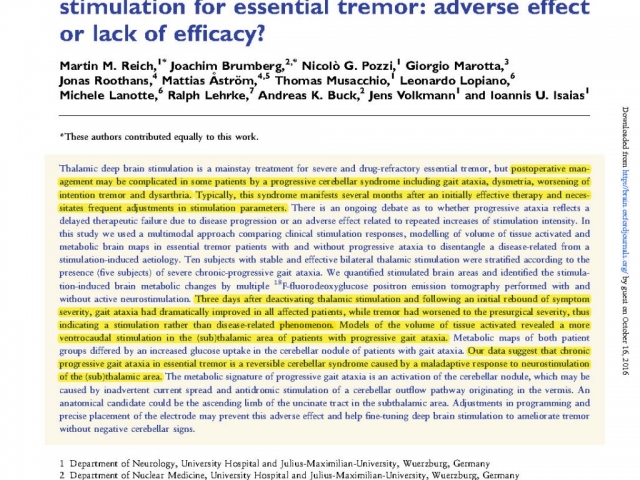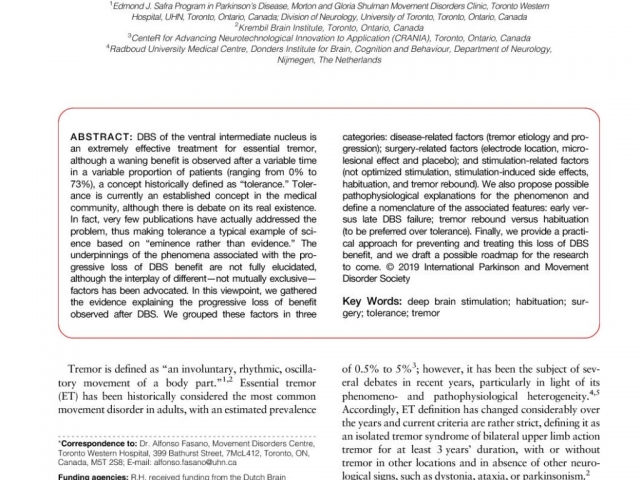Interesting starter on the role of Cannabis in the treatment of Essential Tremor.
Essential Tremor treatment
New Biogen / Sage Therapeutics Partnership
We wanted to share with you our recent press release on an important Sage announcement regarding a global collaboration between Sage and Biogen related to SAGE-324. We are excited about this collaboration, as it aligns the efforts of two companies committed to patients and driven by a passion for brain health. https://www.businesswire.com/news/home/20201127005340/en/
Considering Surgical treatment?
My essential tremor was getting worse. I had tried, over the years, a number of the currently available medications for ET – without any effect. As has been detailed on this site, I consequently had surgical treatment for my ET. I therefore understand the frustration many feel leading to them deciding on surgical treatment for their tremor. I am convinced that surgical treatments are effective. However we are talking about the brain. As I well know, it is incredibly complex & every bodies’ brain is unique. Therefore it is incumbent on everyone considering it, to do due diligence & learn as much as they can prior to having it done.
To provide some initial assistance. Dr. Rodger Elbe has provided the following. I welcome any further information that you feel is appropriate to help someone considering surgical treatment for their ET
Peter
New therapy enters Phase II testing
Sage Therapeutics is about to begin Phase II testing of Sage-324 for Essential Tremor. There is a lot to learn about the way Sage is thinking about Neurological Disorders on their corporate website at:
- https://www.sagerx.com/programs-research/neurologic-disorders/
- https://www.sagerx.com/programs-research/pipeline/
- https://investor.sagerx.com/news-releases/news-release-details/sage-therapeutics-announces-clinical-updates-and-progress-across
Essential Tremor and Alcohol Addiction
ESSENTIAL TREMOR AND ALCOHOL ADDICTION
Movement disorder specialists (and all doctors, for that matter) need to be educated about addiction, and focus on treating patients as a whole person, and not just the symptoms presented.
My spouse has essential tremor and realized, many years ago, that alcohol calms the tremors. Now, after years of self-medicating with alcohol to treat the tremors, and also to calm anxiety, we’re dealing with alcohol dependency, and the doctors are either dismissive of it, or simply don’t know how to deal with it.
I’m aware that many patients with essential tremor use alcohol to treat symptoms. In fact, many doctors even recommend alcohol as an occasional treatment. But, at what point does the medical community become concerned about alcohol abuse and addiction, and actually learn how to deal with it?
When told how much alcohol my spouse drinks in a day, various medical providers have offered no concern or warnings about the dangers of high alcohol use. They have not asked questions to determine if that amount is actually required to control the tremors, or if the alcohol is being used for other reasons.
In my spouse’s case, alcohol is also being used to calm daily and situational anxiety. But, the neurologist dismissed the anxiety as being caused only by the tremors. I realize that essential tremor causes severe social anxiety and embarrassment. But many other life events create anxiety, as well, and the doctors have suggested no other solution or treatment. In fact, when asked if counseling is recommended for the anxiety, we were told “No, not really”.
I believe it is common knowledge that psychotherapy is the standard treatment for both alcoholism and anxiety. Why wouldn’t a neurologist recommend counseling when a patient has other known conditions, in addition to essential tremors, especially when those conditions, like anxiety, are making the tremors worse?!
Overall, I’m severely disappointed that medical providers seem to have blinders on. They are focused only on trying to make a symptom disappear instead of looking at the overall condition of the patient. Most, if not all, essential tremor patients have daily anxiety. Physicians need to focus on treating the anxiety as well as the tremors.
Thousands of essential tremor patients treat their symptoms with alcohol and many of those become alcoholics. But the physicians are overlooking that fact, and have no clue how to address the alcohol dependency. Addiction to any chemical substance is a dangerous and deadly disease. For any medical provider to be dismissive of a patient chemically dependent on a substance is a serious ethical issue.
The good physician treats the disease; the great physician treats the patient who has the disease. —Sir William OslerUpdate:
Doctors are not treating the patient as a whole person – What happened to “bedside manner”?
So, our most recent appointment with the neurologist was severely disappointing. The topic of alcohol dependency was the primary topic, which is good because it needs attention. However, the doctor was severely callous and insensitive in addressing this topic. We felt insulted by the severe lack of compassion used to address this issue.
No one who is dependent on alcohol is proud of it. Essential tremor is a physical condition with a wide variety of emotional consequences. Not only are the tremors embarrassing, but when a person also becomes dependent on alcohol, and also can’t find a tremor medication that works to replace the alcohol, they can feel like they’re in a helpless position.
When a physician is asked to help with this situation, and responds with flippant, insensitive remarks, as if he’s talking to a drug addict, it is extremely discouraging and embarrassing for the patient, and very unprofessional for the medical provider.
Patients need to be treated as a whole person, which means each person has feelings and deserves compassion and respect, no matter what medical or emotional conditions they are dealing with.
Written for HopeNET by an author whose name is withheld for privacy.
Experts Review Surgical Treatments for Essential Tremor
We are fortunate that ET experts recently reviewed surgical treatments for ET to write this paper entitled Surgical Treatments for Essential Tremor. They include DBS (deep brain stimulation), FUS (focused ultrasound surgery/ablation), SRS (stereotactic radiosurgery), and radiofrequency ablation treatment. The authors detail when surgical treatment is an option (when tremor symptoms are severe) plus they cover complications and outcomes, including limited effectiveness and possible need for repeat or additional surgery. Details are also included for those with voice and head tremor. Patients may have tremors bilaterally, that is on both sides of their body, however certain surgeries are found to have better outcomes if the procedure is done unilaterally, meaning the outcome affects only one side and is therefore a partial solution.
For a better understanding of what is happening in the brain of someone with ET, read the paper’s introduction. It explains how the tremor signals travel along a communication loop in the brain known as the corticobulbocerebellothalamocortical loop. It also tells how the surgeries for ET target the ventralis intermedius (Vim) or the posterior subthalamic area (PSA) right below the Vim, and surgical stimulation in these spots disrupts the signals in the loop, lessening tremor. If we can locate a visual image of this loop we will post it! The authors’ key issues, conclusions and expert commentary are worth reading especially for those interested in surgical options with supporting data. Overall, the authors, Elble, Shih and Cozzens comment on the rapid improvements being made in surgical treatments.
This paper was supported in part by a grant from the Illinois-Eastern Iowa District Kiwanis Neuroscience Foundation.
Research Study Focus on Improving Treatment of ET with the Use of Mobile Devices
![]()
Five months ago in October New Touch Digital, LLC, a software company with a vision for improving Essential Tremor treatment through technology, came to several Maryland ET support groups to express their research study ideas. By collecting measurable data about ET symptoms on tablets or computer devices, information on a patient’s symptoms could be conveyed to the patient’s neurologist. This data gathering process is understandably important since ET symptoms are not always readily apparent at a short doctor’s office visit. See New Touch Digital’s easy-to-understand description of the research by clicking here. They are about to embark on their study in the D.C. Metro area and plan to select a limited number of participants, therefore the participation inclusion criteria for the study is given below.
ET inclusion criteria and time line
Act Now and Give Your Public Comment on Focused Ultrasound Procedure
If you suffer from Essential Tremor and are interested in receiving the non-invasive procedure Magnetic Resonance guided Focused Ultrasound (MRgFUS)……
YOU NEED TO ACT NOW!!!
National Government Services (NGS Medicare), the Local Medicare Contractor that oversees benefit administration for Medicare beneficiaries residing in the following states: Connecticut, Illinois, Maine, Massachusetts, Minnesota, New Hampshire, New York, Rhode Island, Vermont, and Wisconsin recently published a “DRAFT” Local Coverage Determination (LCD) on the topic of MRgFUS for essential tremor. While NGS feels the technology is “promising”, they came to the conclusion that they will NOT consider this procedure to be a covered benefit. This is very disheartening as MANY people who suffer from tremor could benefit from this procedure.
NGS Medicare is allowing public comments on the subject through November 30, 2017. Without significant written comments by the public, the draft policy will likely be finalized in its current unfavorable decision.
If you would like to submit comments, encouraging NGS Medicare to provide coverage for its Medicare beneficiaries, you can do so by sending them electronically. Please reference the following in your subject line: Re: Magnetic Resonance Image Guided High Intensity Focused Ultrasound (MRgFUS) for Essential Tremor: DL37421
The email address for submitting comments is: PARTBLCDCOMMENTS@anthem.com
Act Now and Give Your Public Comment on Focused Ultrasound Procedure
If you suffer from Essential Tremor and are interested in receiving the non-invasive procedure Magnetic Resonance guided Focused Ultrasound (MRgFUS)……
YOU NEED TO ACT NOW!!!
National Government Services (NGS Medicare), the Local Medicare Contractor that oversees benefit administration for Medicare beneficiaries residing in the following states: Connecticut, Illinois, Maine, Massachusetts, Minnesota, New Hampshire, New York, Rhode Island, Vermont, and Wisconsin recently published a “DRAFT” Local Coverage Determination (LCD) on the topic of MRgFUS for essential tremor. While NGS feels the technology is “promising”, they came to the conclusion that they will NOT consider this procedure to be a covered benefit. This is very disheartening as MANY people who suffer from tremor could benefit from this procedure.
NGS Medicare is allowing public comments on the subject through November 30, 2017. Without significant written comments by the public, the draft policy will likely be finalized in its current unfavorable decision.
If you would like to submit comments, encouraging NGS Medicare to provide coverage for its Medicare beneficiaries, you can do so by sending them electronically. Please reference the following in your subject line: Re: Magnetic Resonance Image Guided High Intensity Focused Ultrasound (MRgFUS) for Essential Tremor: DL37421
The email address for submitting comments is: PARTBLCDCOMMENTS@anthem.com
Interested in Participating in a Clinical Trial for Essential Tremor?
If you live in or near any of these U.S. locations you may want to consider this trial, called the T-Calm Study, detailed on the flyer. There are a number of sites across the country where you can participate:
-
-
- Ann Arbor, MI
- St. Louis, MO
- West Palm Beach, FL
- Farmington Hills, MI
- Nashville, TN
- Boca Raton, FL
- Raleigh, NC
- Atlanta, GA
- New York, NY
- West Bloomfield, MI
- Savannah, GA
- La Jolla, CA
- Kansas City, KS
- Tampa, FL
- Boston, MA
- Houston, TX
- Chicago, IL
-
More information about the study and about the clinical-stage pharmaceutical company, Cavion, Inc., can be found here and here.


